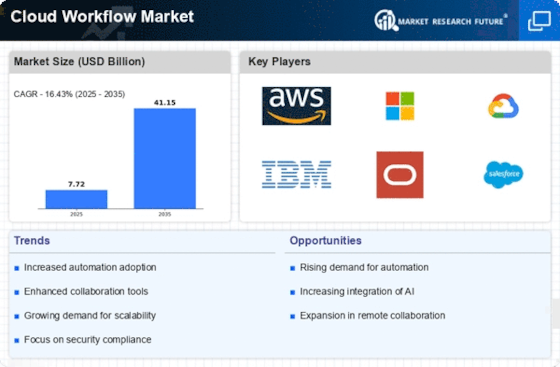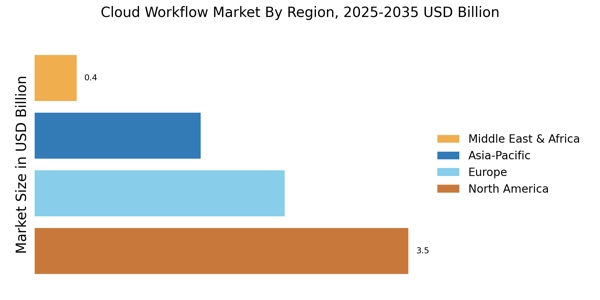Expansion of Cloud Ecosystems
The Cloud Workflow Market is experiencing a notable expansion of cloud ecosystems, which is reshaping how organizations approach workflow management. The proliferation of cloud service providers and platforms has led to the development of interconnected ecosystems that facilitate seamless integration of various tools and services. This trend is evidenced by the increasing number of partnerships and collaborations among cloud providers, enabling businesses to create customized workflows that suit their specific needs. The ability to integrate diverse applications within a unified cloud environment enhances flexibility and scalability, allowing organizations to adapt to changing demands. As the ecosystem continues to evolve, the Cloud Workflow Market is expected to grow, driven by the need for integrated solutions that streamline workflows and enhance overall operational efficiency.
Integration of Advanced Analytics
The Cloud Workflow Market is witnessing a transformative shift with the integration of advanced analytics. Organizations are increasingly leveraging data analytics to gain insights into their workflows, identify bottlenecks, and enhance decision-making processes. Recent studies suggest that businesses utilizing analytics within their cloud workflows can achieve up to a 25% improvement in process efficiency. This trend is indicative of a broader movement towards data-driven decision-making, where organizations seek to optimize their operations based on empirical evidence. The ability to analyze workflow data in real-time allows companies to make informed adjustments, thereby improving overall performance. As the demand for data-driven insights continues to grow, the Cloud Workflow Market is expected to thrive, driven by the integration of advanced analytics into workflow solutions.
Rising Demand for Operational Efficiency
The Cloud Workflow Market is experiencing a notable surge in demand for operational efficiency. Organizations are increasingly seeking solutions that streamline processes, reduce manual intervention, and enhance productivity. According to recent data, companies that adopt cloud workflow solutions report up to a 30% increase in operational efficiency. This trend is driven by the need to remain competitive in a rapidly evolving business landscape. As organizations strive to optimize their workflows, the adoption of cloud-based solutions becomes imperative. The ability to automate routine tasks and facilitate collaboration across teams is reshaping how businesses operate. Consequently, the Cloud Workflow Market is poised for substantial growth as more enterprises recognize the value of efficient workflows in achieving their strategic objectives.
Growing Emphasis on Remote Work Solutions
The Cloud Workflow Market is significantly influenced by the growing emphasis on remote work solutions. As organizations adapt to flexible work arrangements, the demand for cloud-based workflow tools has surged. Data indicates that approximately 70% of companies are investing in cloud solutions to support remote collaboration and communication. This shift is not merely a response to changing work environments; it reflects a broader trend towards digital transformation. Cloud workflows enable teams to collaborate seamlessly, regardless of their physical location, thereby enhancing productivity and engagement. The ability to access workflows from any device further underscores the appeal of cloud solutions. As remote work becomes a permanent fixture in many organizations, the Cloud Workflow Market is likely to expand, driven by the need for effective remote collaboration tools.
Increased Focus on Compliance and Security
The Cloud Workflow Market is increasingly characterized by a heightened focus on compliance and security. As organizations migrate their workflows to the cloud, concerns regarding data security and regulatory compliance have become paramount. Recent surveys indicate that over 60% of businesses prioritize security features when selecting cloud workflow solutions. This trend is driven by the need to protect sensitive information and adhere to industry regulations. Cloud providers are responding by enhancing their security protocols and offering compliance certifications to instill confidence among users. The emphasis on security not only safeguards organizational data but also fosters trust among clients and stakeholders. As compliance requirements evolve, the Cloud Workflow Market is likely to see continued growth, with security and compliance becoming integral components of cloud workflow solutions.

















